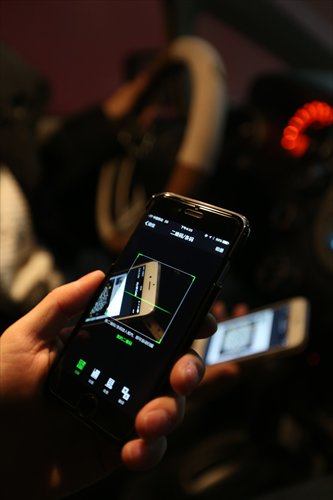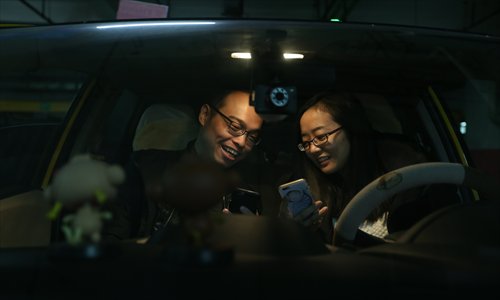Share a cab, share a bed
Collaborative consumption apps spark romantic flame between users

Sharing economy apps allow users to meet more people outside their social circle, and bring more romantic relationship opportunities. Photo: Cui Meng/GT
It was around 7 pm one Wednesday in July when 40-year-old investment banker Feng Xiaodong decided to call it a day and head home. He turned off the light in his office and called a car using the popular ride-sharing app Didi Kuaiche; littledid he know that the driver he called would turn out be his future wife.
Feng usually drives himself, but whenever his license plate number is restricted from the road, he uses a carpooling app to get around. Ride-sharing apps like Didi Kuaiche afford users the option of getting a lift from private car owners who are registered with the service provider. Feng said he prefers this mode of transport because "private cars are cleaner and more comfortable."
After he had gotten into the car, the driver asked Feng if they could stop to pick up her son on the way to his destination. Feng consented.
"We started talking and I found out we are the same age and she is a middle-school teacher," Feng said. "She got divorced four years ago and has a son, just like me."
The two talked about their experiences, including issues they encountered during their divorces, how to deal with their former spouses and how to raise a child alone.
"It was a one-hour drive and we talked through it. We both felt that we hadn't been so relaxed or confided so much about ourselves in a long time," Feng said.
The understanding and intimacy they shared during the drive spurred them to stay in touch after the trip. The affection between them deepened and the two decided to get married last month.
Sharing economy apps are not limited to ride-sharing services; they cater to meal and home sharing needs as well, and have become the mainstay of tech savvy people. Feng and his fiancée are not the only persons to have developed a romantic relationship from a chance meeting brought about by sharing economy apps.
Chen Zhilin, a relationship counselor based in Chongqing, said he believes sharing economy apps are more efficient than traditional dating apps or a blind date when it comes to starting a romantic relationship.

Sharing economy apps are more efficient when it comes to romantic relationships because they provide users with a social setting, which is one of the prerequisites for making new friends. Photo: Cui Meng/GT
Provide a social setting
After the female driver had picked up her 4-year-old son that night, Feng started to play with the child.
"I like children, and the boy reminded me of my son who lives in Germany with my ex-wife," Feng said. "Later that night, my now fiancée told me she felt the warmth of family again after seeing me get on so well with her son. She said it made her start to consider me as a potential romantic partner."
Chen said what makes sharing economy apps more efficient in romantic relationships is they provide users with a social setting.
Compared to dating apps such as Momo, the QQ dating group or WeChat, where users communicate online first, using sharing economy apps means the users can meet in person immediately, and the things they share can be in a perfect social setting, whether it is a car, a house or a meal, Chen said.
"And unlike being on a blind date, meeting people while using a sharing economy app means they can see how the person behaves in their daily life instead of the person they would project while on a date," Chen said.
Wei Wuhui, a professor who studies the Internet and new media at Shanghai Jiaotong University, said sharing economy apps do bring some romantic social opportunities for their users because they allow users to meet more people outside of their social circle.
"For most working people, their social circle is very limited. They commute between home and work every day, and barely have the opportunity to meet anyone new. Through sharing economy apps, they can meet other working people like themselves," Wei said.
Feng said that besides his future wife, he also made some friends through carpooling apps.
"I remember I added a guy who works at a television station to my WeChat after carpooling with him. Since we both have similar interests in new media, we decided to keep in contact. Maybe we can come up a business plan someday," he said.
Adding a romantic flair
Sun Hao, a psychologist based in Beijing, said that sharing economy apps are more efficient when it comes to romantic relationships because they have a more romantic flair and users usually share the same interests.
She said when one meets someone through a sharing economy app their goal is just to share a car or house; they are not actively looking for romance at that time. Their guard is down, which in turn makes it easier for them to feel romantic toward each other.
"The stronger the intentionality is in socialization, the more people will set up a psychological defense mechanism, and the socialization will be more likely to fail," Sun said.
Also, Chinese people like to believe in fate when it comes to relationships. Meeting people while carrying out daily activities like carpooling will make one feel it's a chance meeting, and add to the romantic flair, she said.
Lu Hang (pseudonym),27, a Beijing-based IT programmer, met the girl of his dreams in August while working as a part-time rush-hour Uber driver.
"It was a rainy night, and she was waiting for me at the curb. She was wearing a white dress and holding a yellow umbrella. I fell for her immediately. She finally became my girlfriend after two months," Lu said.
"I had gone on a lot of blind dates my parents or friends set up before that, but it is too practical and materialistic, not romantic at all. I prefer some kind of chance meeting," he said.
Sun also said that when people meet through sharing economy apps, it usually means that they are from the same social class, or have the same interests or tastes, which will make it easier to become attracted to each other.
Zhang Fan, 30, a Shanghai-based financial analyst, met his girlfriend in September 2013 while subletting one of his bedroom on Airbnb.
She had traveled to Shanghai from Ningbo, Zhejiang Province, looking for a place with personal taste to stay and experience how locals live.
"She chose my apartment because she liked the vintage decorations, the patio, and my cat. We have similar tastes and interests, which gave us a lot to talk about," he said. "We even like the same movie - The Lake House (2006) starring Keanu Reeves. The moment I learned that, I immediately felt that we belong together."
Zhang said their long-distance relationship only lasted a year, but the two remain friends.
Safety concerns
There are also serious concerns about starting a romantic relationship based on such an experience.
Feng said although he met his future wife through carpooling, generally, people who want to have a romantic relationship via this method are too materialistic, and the relationship tends to be short-lived.
He said he has some colleagues who provide carpooling services during rush hour with the sole purpose of hitting on girls. "They usually drive a high-end car, and, if they see the girls are very forward, they just assume the girls like their money; in the end, the relationship they have only lasts one night."
Wei said meeting people through sharing economy apps can sometimes lead to sexual harassment.
Ma Lina, 26, a personal assistant in Shanghai, was hit on three times. The most shocking one was in July 2014 when the driver from the previous night suddenly turned up at her doorstep to ask if she could be his girlfriend.
"I was startled. The way I see it, it's just a deal, we share a car for a short amount of time and then go separate ways. It's very difficult for people to have profound feelings under those circumstances," said Ma. "I am also concerned about my safety, considering that I have to give them my address."
Wei said several companies such as Didi have already realized the problem and are attempting to adopt technology that would give users a fake telephone number while using the service so that their personal information will not be shared.
"Female users can also consider getting the drivers to drop them a short distance away from their home to better protect themselves," Wei said.